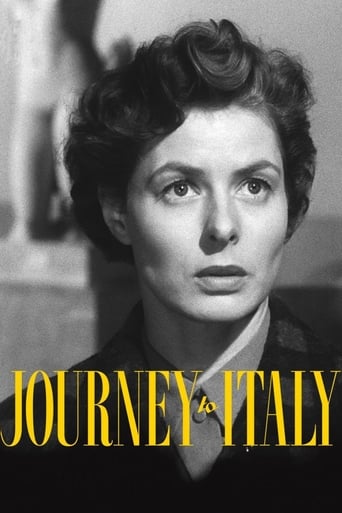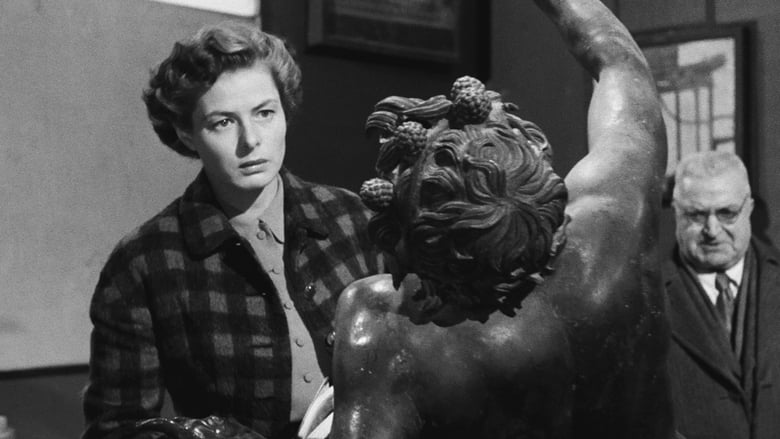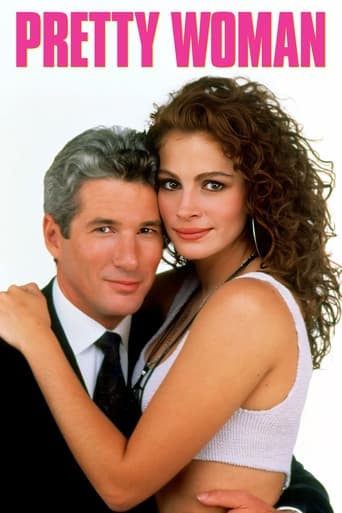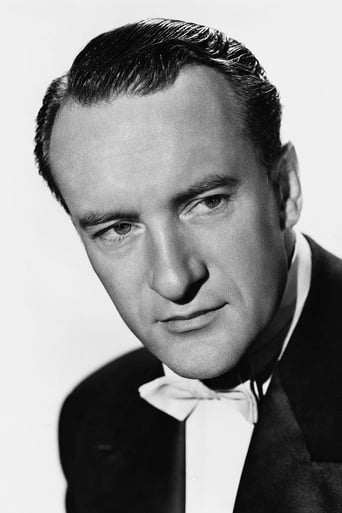

Journey to Italy (1954)
This deceptively simple tale of a bored English couple travelling to Italy to find a buyer for a house inherited from an uncle is transformed by Roberto Rossellini into a passionate story of cruelty and cynicism as their marriage disintegrates around them.
Watch Trailer
Cast
Similar titles



Reviews
Why so much hype?
Powerful
Absolutely Fantastic
Exactly the movie you think it is, but not the movie you want it to be.
Look, it's Rossellini in the Fifties, B&W, with Bergman, shot at all these great sites in Italy. So sure, on some level I'm going to enjoy it. But that doesn't mean I have to buy into its reputation as a great movie. The story centers on the relationship of an "English" couple. They've been married for eight years. They're unhappy. Their marriage is on its last legs. At the end of the movie, they get back together. So the movie has to be how whatever we see happen in it culminates in their reconciliation. And it utterly fails to do that. First, WHY are these two together at all? She's obviously not English. How did they get together? But more important, the husband, played by George Sanders, is SO unappealing, so cold, so wretched, that's it's impossible to see what attracted a romantic like the Bergman character to him. I get it that he's English, upper (or upper-middle) class, emotionally stunted from going to English public schools, etc. You don't expect him to insist on couples' counseling. (I love the Sanders line, when he wants to describe the essence of a couple he met, and settles on simply "talkative.") But Rossellini has got to give us SOMETHING to go on, something to show us that he has some humanity, or had at one point. Or show us in the film how he has changed, and why, because of his time in Italy. This is a guy who goes into a rage because his wife takes the car without asking him. But there's so little sign that he can be more than what we see. He has a short dalliance with a woman who tells him that she is going back to her old lover. And you get the feeling if she hadn't said no, he would still be with her. As for Bergman, her character is more sympathetic and interesting. But she looks frumpy -- why hire Bergman and then make her frumpy? -- she's self-pitying, and weak. She stirs some sympathy, but not much. At the end, in a last-second, not-believable change of heart, the husband says to his wife: "If I tell you I love you, do you promise not to use it against me?" Just what every woman longs to hear.
This film is one I found listed in the pages of the book 1001 Movies You Must See Before You Die, I would probably never have been attracted to this film if it weren't for this recommendation, I hoped it would be deserved of it. Basically husband and wife Alexander 'Alex' (George Sanders) and Katherine Joyce (Ingrid Bergman) are a wealthy and sophisticated English couple who have travelled to Italy to to sell a large property they have recently inherited from a deceased uncle near Naples. Alex is a workaholic businessman, while Katherine is more sensitive, their relationship is cooled and strained by the journey to Italy, as well as Katherine remembering poignant memories of now deceased poet friend Charles Lewington, he died in the war. Katherine tours museums of Naples and Pompeii, Alex flirts with women on Capri, his sarcasm and bluntness and her critical nature cause their marriage to disintegrate within days of arrival, they agree at one point to consider divorce, but it is a religious procession in Pompeii that they are caught up and their love for each other is rekindled. Also starring Maria Mauban as Marie, Paul Muller as Paul Dupont, Anthony La Penna (Leslie Daniels) as Tony Burton and Anna Proclemer as Prostitute. To be honest, I could not concentrate fully on everything going on, because it was so chatty, only my interest in Bergman and the sights of Italy kept me engaged a little, it is perhaps to simple in narrative and plot, but if you see the journey of the title being both physical and spiritual I suppose you can get a little something out of watching this romantic drama. Worth watching, at least once, in my opinion!
The day I'm writing this review marks the 100th birthday of my favorite actress, the lovely Ingrid Bergman. Because of this, I decided to watch an Ingrid Bergman film, and the one I chose was the wonderful "Journey to Italy".I'd never before seen a film from the acclaimed filmmaker Roberto Rossellini, and I really wanted to considering how much praise Martin Scorsese has given him. After watching this film, I'm excited to see more of his work because this movie was pretty great!It is a beautiful drama film about a married couple (played by Ingrid Bergman and George Sanders), and their trip in Italy. They're marriage isn't going very well, and it is possible that they're going to have a divorce. Other than this, the film is very light of plot, but the amount of plot in a movie doesn't really matter to me, the only thing that really matters is how good the movie is, and "Journey to Italy" is pretty great!
Roberto Rossellini wasn't about to rest too much on his laurels - or let a little thing like a controversy slow him down (an affair with Ingrid Bergman that wrecked marriages, albeit produced daughter Isabella which is nothing short of miraculous) - so a film like Journey to Italy seemed like just the thing to get him motivated and challenged. It's a challenging picture. There's not the same sort of melodramatic drive through a lot of it that you see in Rome Open City or even Stromboli - at least until perhaps the last third. I remember seeing the clips in Scorsese's Italian movies documentary, though it was hard to come by except on over-priced VHS online, until the Criterion collection put out a Rossellini/Bergman box-set, which gave me my chance last year.I have to wonder if Kubrick might've watched this film before making Eyes Wide Shut, if only for the early scenes. But there's little chance for real romance here; Bergman and George Sanders are the married couple, on holiday in Rome. Well, partly holiday anyway, more like an estate deal that's being closed on (an inhereted villa in Naples actually), and she's bored out of her mind... at first. Very slowly as she goes on trips to museums, encouraged by an acquaintance, there is a certain mood about Rome, a history, the objects which loom over her and speak to something MORE than what she is experiencing in her life and marriage, that do something to her.Of course, stuffy George Sanders can't see that - nor that their marriage isn't very happy at the moment, or about there being a lost lover in the equation as well (flirting for Sanders, too). And there may be more trouble on the horizon as well, but what's so fascinating is that Rossellini keeps a lot of things under the surface, the unspoken between the two, the tension, is what has to be put forward. For drama, this can be tricky, and Rossellini with his documentary background is able to get his actors to such a place as to be totally comfortable in their characters - people who are paradoxically uncomfortable with where they're at, romantically, spiritually (spirit's a big one), and geographically. And in a sense the ultimate message here reminds me of the line from Night of the Living Dead, where an unhappy married woman says to her husband: "We might not like living together... but dying together won't solve anything." Is this couple sort of, you know, trapped? Most likely, and the zombies are actual conflicts they're avoiding in life. A lot of what they end up seeing together is death. This comes by the way right when they tentatively agree after a really bad argument (there's a lot of arguing here by the way, but all believable because it's these two stars who are tremendous talents. They're taken along on an archaeological expedition, and they're privy to the remains of people from long ago. It's a startling, breathtaking sight for them, maybe more for Sanders in a way because he hasn't already been exposed to these bewildering, eye-opening sights like Bergman has. And this realization of one's mortality dawns ever closer.Journey to Italy was a prized darling among the French New Wave, and perhaps it's because of the questions it raises about life and death, love and loss, and having any sort of REASON for anything, that gives it an existential edge. Have things been too petty for them? Can they reconcile? The ending is where Rossellini finally lets things boil over dramatically speaking: in a way this is a more sophisticated film, if a little harder to exactly "enjoy" outside of a sort of intellectual level (unlike, say, Open City), but when Bergman and Sanders are torn apart, if only briefly, by a parade, it becomes a BIG struggle, and that's what counts. What will you do with the time you have here? Love, squabble, fight, bicker, take things in and experience things? Maybe all of those.I'm glad the movie was re-discovered and championed by those crazy bunch of Cashier du Cinema folks; the movie works its way ever so slowly on you, and has the layers of great art revealing itself. Did I mention how good these two actors are, especially Bergman again with her husband/musee? Good, it's worth repeating.









